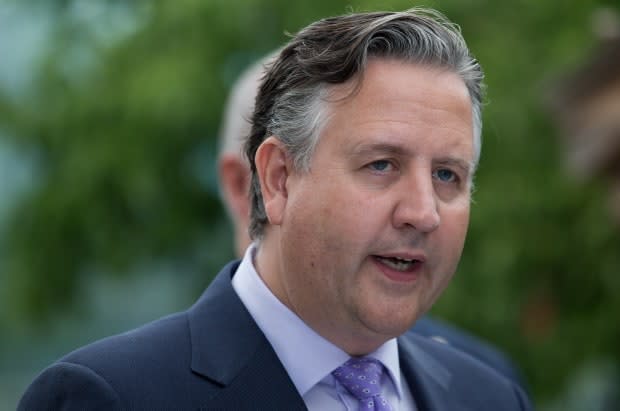Vancouver Mayor wants Indigenous leaders to head possible 2030 Olympic bid
It was during one of the early planning sessions for the 2010 Vancouver Winter Olympics that Chief Gibby Jacob heard a provincial government official talking about the Callahan Valley, which would eventually host cross-country skiing and ski jumping during the Games.
Jacob, who participated in the bidding process for the Olympics and was a member of the Games organizing committee board, finally put up his hand.
"I asked who the hell is this Callahan and how the hell did he get his name on our lands," the Squamish Nation hereditary chief said with a chuckle. "They all looked at each other. I said find out and let us know."
It turns out the Callahan Valley, located near Whistler, B.C., was named after one of the early surveyors in the region.
"That was the start of our big push to get our names back on places," said Jacob.
Indigenous groups had a voice in organizing and hosting the 2010 Games. But Vancouver Mayor Kennedy Stewart has suggested any movement to bring another Games to the city should be headed by Indigenous leaders.
In early November, Vancouver city council voted to postpone a decision on whether it wants to explore making a bid. City staff are expected to present a report to council in early 2021.

Stewart has said one of his conditions for supporting a bid is that the Musqueam, Squamish and Tsleil-Waututh — the three Indigenous First Nations whose traditional territory includes Vancouver — head the Olympic bid committee.
"I have talked to the Nations about this and there's interest there," the Vancouver Sun reported Stewart saying in a state-of-the-city address to the Greater Vancouver Board of Trade.
Emails to Stewart's office asking to explain the mayor's proposal were not immediately answered.
Khelsilem, a councillor with the Squamish Nation Council, isn't aware of any formal talks about leading a bid.
"We haven't had any formal discussion about it," he said. "We haven't made any formal decision about whether we want or don't want. And we haven't had any formal discussions with our neighbouring nations."
Representatives of the Musqueam and Tsleil-Waututh did not respond to interview requests.
Khelsilem said before any decision is made, the pros and cons of hosting an Olympics must be weighed.
"The reality is that something like hosting an Olympics requires a significant amount of investment and support from both the federal and provincial governments," he said. "While there are a number of reported advantages, there's also a number of drawbacks.
"I think a lot of that workflow needs to be figured out, especially in the context of the challenges that we're going to face over the next decade and the challenges that we're facing on a number of fronts."
Furthermore, Jacob said: "there's a lot to be gained by being involved [in a bid] for our people."
"I don't think that our nations, given what we have as far as leadership resources and how fast they seem to change, would be able to take things right from scratch to completion," he said.
Creating a common agenda
With 15 of the venues used for the 2010 Olympics built on First Nation traditional territories, Indigenous support was crucial for the Games success. The Squamish, Tsleil-Waututh, Musqueam and Lil'Wat nations formed The Four Host First Nations, a non-profit organization with the goals of uniting Canada's Indigenous people and encouraging inclusion across the country.
"I think it created a common agenda," said Jacob. "By doing that and achieving what we set out, it was totally outstanding.
"I think it showed leadership that the four separate First nations could work together for a common purpose and get benefits from it."
WATCH | President of 2010 Games says Vancouver should bid for 2030:
Involvement in the Games raised awareness of Indigenous issues across Canada, he said.
"When we first started out, we were pretty invisible in our own territories," said Jacob.
Indigenous groups did "fairly well in compensation for the use of our lands," he said. The Olympics also led to traditional Indigenous names being returned to locations and landmarks plus recognition of First Nation arts and culture.
John Furlong, who was head of the Vancouver Organizing Committee for the 2010 Olympic and Paralympic Winter Games (VANOC), is part of the group looking at the 2030 Games. He said any bid would be impossible without Indigenous participation.
"I see no scenario at all in which First Nations are not involved," he said. "They were a difference maker in 2010.
"First Nations are in multiple new business since 2010. My instincts tell me they will be keenly interested in being involved again."

 Yahoo Sports
Yahoo Sports 